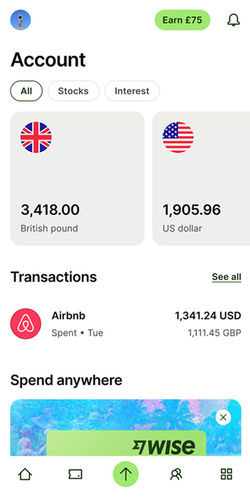Compare the best ways to send money to Germany
Get the best deals when you transfer money to Germany. Find the cheapest, fastest, and most reliable providers with the best EUR exchange rates.
Read on for the best EUR deals, expert information, and all you need to transfer money to Germany.
Send money to Germany
"Over 16 million customers use Wise, mostly for their excellent mobile app, transparent fee structure & use of mid-market rates. Now increasingly used for larger transfers."
"Over 16 million customers use Wise, mostly for their excellent mobile app, transparent fee structure & use of mid-market rates. Now increasingly used for larger transfers."
"Over 16 million customers use Wise, mostly for their excellent mobile app, transparent fee structure & use of mid-market rates. Now increasingly used for larger transfers."
"Xe has over 30 years of currency exchange experience, and is one of the most reputable names on the market. 200 countries, 100 currencies, & funds often received in seconds."
"Xe has over 30 years of currency exchange experience, and is one of the most reputable names on the market. 200 countries, 100 currencies, & funds often received in seconds."
"Xe has over 30 years of currency exchange experience, and is one of the most reputable names on the market. 200 countries, 100 currencies, & funds often received in seconds."
"Over 16 million customers use Wise, mostly for their excellent mobile app, transparent fee structure & use of mid-market rates. Now increasingly used for larger transfers."
"Over 16 million customers use Wise, mostly for their excellent mobile app, transparent fee structure & use of mid-market rates. Now increasingly used for larger transfers."
"Over 16 million customers use Wise, mostly for their excellent mobile app, transparent fee structure & use of mid-market rates. Now increasingly used for larger transfers."
"Currencies Direct have over 30 years of global money transfer expertise. Award winning service with a TrustPilot rating of 4.9. Lock-in rates for the future or trade 24/7 on web or mobile."
"Currencies Direct have over 30 years of global money transfer expertise. Award winning service with a TrustPilot rating of 4.9. Lock-in rates for the future or trade 24/7 on web or mobile."
"Currencies Direct have over 30 years of global money transfer expertise. Award winning service with a TrustPilot rating of 4.9. Lock-in rates for the future or trade 24/7 on web or mobile."
"Revolut has 50+ million customers globally. You can hold up to 36 currencies in the app and send money quickly in 70+ currencies to 160+ countries."
"Revolut has 50+ million customers globally. You can hold up to 36 currencies in the app and send money quickly in 70+ currencies to 160+ countries."
"Revolut has 50+ million customers globally. You can hold up to 36 currencies in the app and send money quickly in 70+ currencies to 160+ countries."
"Key Currency offers a personal service with a dedicated account manager. There are no transfer limits or fees which is perfect for larger send amounts."
"Key Currency offers a personal service with a dedicated account manager. There are no transfer limits or fees which is perfect for larger send amounts."
"Key Currency offers a personal service with a dedicated account manager. There are no transfer limits or fees which is perfect for larger send amounts."
"Xe has over 30 years of currency exchange experience, and is one of the most reputable names on the market. 200 countries, 100 currencies, & funds often received in seconds."
"Xe has over 30 years of currency exchange experience, and is one of the most reputable names on the market. 200 countries, 100 currencies, & funds often received in seconds."
"Xe has over 30 years of currency exchange experience, and is one of the most reputable names on the market. 200 countries, 100 currencies, & funds often received in seconds."
"Regency's UK-based account management team has vast experience. Get support on all kinds of transfers, from overseas property transactions to business payments & more."
"Regency's UK-based account management team has vast experience. Get support on all kinds of transfers, from overseas property transactions to business payments & more."
"Regency's UK-based account management team has vast experience. Get support on all kinds of transfers, from overseas property transactions to business payments & more."
"Currencyflow is a new FX broker with a focus on transparent, fair rates and accessible customer service. Contact the UK-based team for a free quote."
"Currencyflow is a new FX broker with a focus on transparent, fair rates and accessible customer service. Contact the UK-based team for a free quote."
"Currencyflow is a new FX broker with a focus on transparent, fair rates and accessible customer service. Contact the UK-based team for a free quote."
"Lumon has cared for over 69,000 customers since 2000. Get support for larger transfers from dedicated currency specialists."
"Lumon has cared for over 69,000 customers since 2000. Get support for larger transfers from dedicated currency specialists."
"Lumon has cared for over 69,000 customers since 2000. Get support for larger transfers from dedicated currency specialists."
"Xoom, a PayPal service, allows you to send money in more than 160 countries. You can send cash for over-the-counter pickup or home delivery, as well as send by bank transfer or debit card."
"Xoom, a PayPal service, allows you to send money in more than 160 countries. You can send cash for over-the-counter pickup or home delivery, as well as send by bank transfer or debit card."
"Xoom, a PayPal service, allows you to send money in more than 160 countries. You can send cash for over-the-counter pickup or home delivery, as well as send by bank transfer or debit card."
"Securely send money to and from 150+ countries and 20+ currencies. Same-day transfers avaialble on most major currencies."
"Securely send money to and from 150+ countries and 20+ currencies. Same-day transfers avaialble on most major currencies."
"Securely send money to and from 150+ countries and 20+ currencies. Same-day transfers avaialble on most major currencies."
"Fast, secure internatinal transfers with no fees and transparent rates. They offer a free currency card for use at home and abroad."
"Fast, secure internatinal transfers with no fees and transparent rates. They offer a free currency card for use at home and abroad."
"Fast, secure internatinal transfers with no fees and transparent rates. They offer a free currency card for use at home and abroad."
"Paysend has transparent fees and rates, with transfer sent within seconds to your recipient's bank. They also have global 24/7 support for any enquiries, and bank-level security."
"Paysend has transparent fees and rates, with transfer sent within seconds to your recipient's bank. They also have global 24/7 support for any enquiries, and bank-level security."
"Paysend has transparent fees and rates, with transfer sent within seconds to your recipient's bank. They also have global 24/7 support for any enquiries, and bank-level security."
"Moneycorp is an established player in the market, with a focus on private clients and corporates. Make overseas payments in over 120 currencies and 190 countries."
"Moneycorp is an established player in the market, with a focus on private clients and corporates. Make overseas payments in over 120 currencies and 190 countries."
"Moneycorp is an established player in the market, with a focus on private clients and corporates. Make overseas payments in over 120 currencies and 190 countries."
"Moneygram is a well established service with over 80 years in the sector. They support over 200 countries worldwide and have over 440,000 retail locations."
"Moneygram is a well established service with over 80 years in the sector. They support over 200 countries worldwide and have over 440,000 retail locations."
"Moneygram is a well established service with over 80 years in the sector. They support over 200 countries worldwide and have over 440,000 retail locations."
How to get the best rate when sending money to Germany
Always compare rates
Don't pay more than you have to. Use our live comparison tool to make sure you aren't missing the best EUR rates.
Choose a provider
Select the provider that offers you the most EUR and fits your needs.
Click, sign up & transfer
Follow the steps & make your transfer. Your EUR will soon be on the way.
The best way to send money to Germany: Wise
After reviewing and testing 14 money transfer providers supporting EUR transfers, we found Wise to be the top choice for money transfers to Germany as of February 2026.
With quick transfers, a low markup of 0% on EUR exchange rates, and a low fee of $27.22, Wise offers the ideal balance of cost, speed, and features for EUR transfers.

Key Currency: The cheapest way to send money to Germany
Key Currency charges $0 per transfer to Germany, with a 0.25% markup on the EUR exchange rate. This is 0.01% cheaper than the second cheapest option.
To get the most out of your transfer to Germany, use a bank transfer deposit to maximize the amount of EUR received.

Wise: The fastest way to send money to Germany
With Wise, the transfer time to Germany is same day.
They charge $27.22 in fees and apply a 0% markup on the EUR exchange rate, which is 0% better than the second-best option.
For the best combination of cost and speed, we suggest using bank transfer to fund your EUR transfer.

The easiest way to send money to Germany: Wise
They’re highly transparent with fees, charging $27.22 per transfer with a 0% markup on the EUR mid-market rate.
With multiple deposit and withdrawal options and reliable customer service, getting started with Wise takes less than 10 minutes, making it a fast, cheap, and user-friendly option.

Consider this before sending money to Germany
Whether you're helping out family in Berlin, paying rent for a student in Munich, or wiring funds to a business contact in Frankfurt, how you send money to Germany matters.
Different transfer services charge different fees, offer different EUR exchange rates, and vary in how fast they deliver.
Even small differences can lead to your recipient getting more (or less) euros.
We analyzed 14 top providers that support transfers to Germany.
Here’s what the data shows:
Key Currency was the cheapest in 100% of user searches
Wise ranked as the fastest in 1 EUR searches on MoneyTransfers.com
Wise offered the most favorable EUR exchange rates over the last 7 days
Sending large amounts of money to Germany
Sending large amounts to Germany can be expensive. You should consider the exchange rate, transfer limits, customer service, safety, company experience with large transfers, and any legal requirements in Germany.
In this case, Wise ticks all the boxes. Out of 14 money transfer companies serving Germany, Wise came on top as the highest-rated company for EUR transfers.
Whether you are buying a property in Germany, funding your education, having a destination wedding, or just need to send a lot of EUR, we recommend opting for a specialized provider such as Wise.

Understand the costs of money transfers to Germany
The cost of sending EUR depends on where you're sending from, the amount of EUR sent, deposit and delivery methods, transfer fees, and the markup applied to the EUR mid-market rate.
For example, if you're transferring $7,000 from the US to Germany, you can expect the following:
Transfer fees to Germany
Depending on the service you use to send Euros, transfer fees can be percentage-based, fixed, or a combination of both.
Key Currency charges only $0 per transfer based on our analysis of 14 services supporting EUR transfers in February 2026.
Markup on EUR exchange rate
A markup is a percentage added to the EUR mid-market rate by a money transfer service (or a bank).
Wise offers the best EUR exchange rates by applying a 0% markup on the USD-EUR rate. This means for every US Dollar sent, you receive 0.845 EUR minus 0% deducted from it.
Funding transfer to Germany
How you fund your transfer to Germany can impact the cost:
Bank transfers typically have the lowest fees, often costing up to $0 per transfer.
Debit cards may cost up to $0 per transfer.
Credit cards may come with cash advance fees and increased rates.
Overall, bank transfer is the cheapest funding method for EUR transfers.

Getting the best EUR rate when sending money to Euro
The exchange rate is the value of the Euro (EUR) compared to other currencies. Since it consistently moves up and down, sending at the high will give your receiver more EUR compared to the low.
In the past 7 days, the EUR exchange rate reached:
An average rate of 0.845 Euro per US Dollar
A high of 0.8507 EUR per USD
And a low of 0.8424 EUR per US Dollar
The EUR/USD exchange rate has seen some movements. Making a transfer when the rate is close to 0.8507 EUR/USD will result in more EUR received.
Wise is our top recommendation for sending Euro, offering a markup of 0% which is 0% better than the next cheapest option.
Get notified when it’s the best time to transfer Euros
Sign up for our rate alerts, and we’ll notify you when it’s the best time to send EUR!
Top payment methods to use for transfers to Germany
Money transfer companies will offer different ways to fund your transfer to Germany. Depending on the service used, deposit options can affect the speed, the cost of your transfer, and the amount of EUR received.
Bank transfers
Bank transfers are a standard deposit method used for sending money to Germany. Almost all services covering Germany offer it.
Bank transfers to Germany are usually cheaper than other deposit methods but can take up to 3 business days for EUR to reach Germany.
Out of 14 providers we’ve tested, we found Key Currency to be the cheapest for bank deposits, with just $0 per transfer and a 0.25% markup. This is 0.01% cheaper than the second-best option.
When possible, avoid using wire transfers over the SWIFT network for EUR transfers. It is slower and more expensive due to intermediaries involved, instead, look for an ACH deposit option.

Debit and prepaid cards
Debit card transfers to DE are usually faster than bank transfers.
Most EUR transfers can take up to a few hours but it can be slightly more expensive.
We recommend using Xe if you want to use a debit card or prepaid card to fund your money transfer to Germany.
With Xe, you can expect to pay $0 in fees and 0.48% markup when depositing money with a debit card. This is 0.38% cheaper than using the next best provider out of the 14 companies supporting EUR transfers we’ve tested.

Credit cards
You can also use a credit card to fund your transfer to Germany.
We found a few options for credit card transfers out of 14 companies compared.
Credit card deposits are usually more expensive when sending money to Germany, so if you can, use a bank transfer or debit card deposits so save on fees.
If you do need to make a CC deposit, we recommend running a .
Cash advance alert
Your credit card company may charge you a cash advance fee and offer higher interest rates for international transactions to DE. We recommend avoiding credit cards, and instead opt for a bank or debit card transfer.

How we analyze the market
We track the cost, speed, and product offerings of the leading money transfer services available in Germany.
Our comparison engine and algorithms evaluate providers based on over 25 factors, including transfer fees, ease of use, exchange rates, mobile apps, transfer times & customer support.
We also consider how these services are rated on platforms like TrustPilot, AppStore, and Google Play, giving you a comprehensive view of what to expect.
This thorough analysis helps you get the best available deal - every time you want to move money to Germany.
We also provide unbiased and detailed reviews of all the top money transfer companies. You can use these reviews to find the best service for your needs when sending money to Germany
For a deeper understanding of our commitment to integrity and transparency, we invite you to read our editorial policy and review methodology.

Related transfer routes
Send money from Germany
FAQs
Find answers to the most common questions on our dedicated FAQ page.
Are there any limits when sending EUR?
Are there any tax implications on EUR transfers?
What are the fees and exchange rates?
How long does it take to transfer money to Germany?
Can I schedule regular payments to Germany?
What currency is used in Germany?
Can I send EUR from any country?
What should I do if something goes wrong with my transfer to Germany?
Can I just wire money to Germany with my bank?
Can I use MoneyTransfers.com to transfer money?
Tools & resources
Contributors






.svg)















